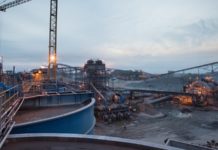[miningmx.com] — PALA INVESTMENTS’ BID for Toronto- and AltX-listed Rockwell Diamonds looks set to trigger an interesting battle.
It’s one the JSE will need to keep a close eye on, though just how it can sanction a bidder over which it has no jurisdiction is unclear. Rockwell listed in Johannesburg only on 30 November last year. It’s part of the Canada’s Hunter Dickinson group of mining entrepreneurs, in which it in turn owns a stake.
Hunter Dickinson has listed nine companies, including JSE-listed platinum prospector Anooraq, and until last year was also involved in JSE-listed Great Basin Gold, which is run by Bernard Swanepoel’s former right-hand man at Harmony, Ferdi Dippenaar, and has prospects both in South Africa and on the Carlin Trend in Nevada.
The listing aimed in part to bring on board a black empowerment partner, as its properties are predominantly alluvial deposits in South Africa, and followed the issue of 25m shares at 60c (C$). The share opened on the JSE at around 440c (SA), which was a modest premium to the issue price. However, like many junior mining stocks it’s since had a grim time.
It peaked in Canada at around 70c and managed to hold at about 60c as recently as June, but then fell away sharply to 20c. In South Africa it held up better, staying as high as 400c at end-July before plummeting to 145c in late August and then rallying to 200c.
So when Pala says that at 36c (C$) it’s offering an 84% premium to the recent price it’s strictly true – but it’s all a matter of timing. Going further back in time tends to corroborate Rockwell’s knee-jerk response that the bid is “unsolicited and opportunistic” – though, as I’ve written previously, “opportunistic” shouldn’t automatically be considered a term of abuse.
More to the point, Rockwell claims it was already discussing with Pala a previous approach at 40c (C$), received on 29 August with a deadline of 5 September. Rockwell had intimated it would respond to that by 12 September, which doesn’t sound unreasonable. But Pala lost no time in making a hostile bid at a lower price when its deadline passed.
In a recent presentation, Rockwell forecast earnings per share of 6,5c (US) in the year to next February, rising to 9,5c, 11c and 12,5c in the following three years. The mix of currencies is confusing, but 9,5c (US) equates to about 75c (SA), while 36c (C$) is around 267c (SA). So that puts the bid on a forward earnings multiple of just 3,6.
Meanwhile, just who or what is Pala? Ironically, it’s Rockwell’s biggest shareholder, with a most recently disclosed stake of around 15%. It calls itself a long-term investment company focused on the mining and natural resources sector, with funds under management of about US$2bn. It provides “tailored investment solutions”. The top group company is based in that well-known financial centre Zug, in Switzerland, and judging by their names, its management is a pretty cosmopolitan bunch.
Its shareholders aren’t disclosed and this goes for the bulk of its investment portfolio, apart from a couple of minor holdings. So just what it can bring to the party – considering that Rockwell’s management has made a pretty good fist of building up production – is unclear.
The bid is conditional on a two-thirds acceptance, including at least 50% from so-called independent shareholders, and will close on 10 November. Before that, Rockwell is scheduled to hold its AGM on 15 September (in London, strangely), which could be a lively event, and to release its interim report on or about 22 October.
Why do I have reservations? Not least because Pala is treating Rockwell’s South Africa shareholders with total contempt. The full-page short-form announcement of the offer (which, bizarrely, is headed in capital letters an OFFER TO PURCHASE FOR CASH but also says “This is neither an offer to purchase nor a solicitation of an offer to sell”) doesn’t even give a rand equivalent of its bid price.
Even worse, it rightly urges shareholders to read the offer documents in their entirety, but is only making them available in Toronto. If it wants a friendly reception in South Africa, it must ensure the documents are also readily available here.
And does Pala understand the imperatives of empowerment? There’s no indication of that in its preliminary announcement.
So far the market seems unimpressed. The share price showed no immediate reaction to the bid announcement, despite the fact that even after the recent recovery 267c is still a 33,5% premium to the market – a more meaningful figure than Pala’s claimed 84%.
Hunter Dickinson’s weakness is that it doesn’t seem to have a significant equity stake in Rockwell and, presumably, earns its way from admin and management fees. Whatever the contracts may say, those would obviously be at risk in the event of a change in control, while Hunter Dickinson won’t be able to compensate for that with a major capital profit.
Indeed, most investors in Rockwell, other than those who bought in the recent dip, will probably show a loss if they accept Pala’s offer. That, rather than any intrinsic opportunism, may be the biggest hurdle to the bid’s success.










